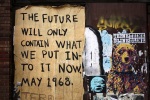On 10-12 June 2013, I was invited as a panel participant to the ISACA Insights World Congress. It was the second time in two weeks – the previous time was during a session at the Amplify Festival – that the panel was asked by the moderator what the future would look like in 2040. At Amplify the question was around the future of work. At ISACA, the question was even more open ended.
Although nobody of course knows what the future will hold, and everything I say on this topic is almost wrong by definition, I believe I surprised my audience with my very dystopian view on the future.
Many seem to believe that the future will be “bright”, with lots of possibilities for hyper-collaboration, in open and shared spaces, where serendipities happen every minute, where hierarchies don’t exist anymore, sort of love-and-peace in a sharing collaborative back-to-Woodstock environment.
That may be the case in 2020, but I think the picture will be less rosy in 2040. Already today, algorithms trade in matter of milliseconds, a real-time world that we as humans can’t even grasp, let only survive. Where those algorithms now work for stock trading companies, by 2040 we will most probably be “augmented” – at best – by our personal algorithms.
It will not be a nice picture to look forward to: by that time, we will be totally ruled by robots and algorithms, and we will have to fight – assisted by our “devices” – for that very last minute of work in a crowded world marketplace where we will have to compete at rates of 1.5$ per hour. And this for probably high-skilled tasks, as the rest will be taken over by robots: a “Present Shock” of technological presence, a world undone of human presence, a very disturbing place where we are ruled by algorithms working on our behalf, where betting on peoples future is the new normal, where siren server masters raise interest fees on the mortgage of the personal success/failure of the data slaves.
The Singularity will have happened, but in quite a different way, in a way that technology owns us, eats us, swallows us, not a singularity of jolly happy people being more intelligent or augmented. A world of technology versus machines, where technology will dictate what it wants from us (See also Kevin Kelly “What Technology Wants” – with Kelly being the technology optimist he is – and Jaron Lanier “Who Owns the Future?”).
What we have witnessed during the last weeks’ revelations represents a true tipping point. Where we still may have had the illusion that we could empower ourselves, take charge, we will be at best be empowered by other powers: a new dystopian world where authoritarian technology rules, an authoritarian singularity, where we are reduced to data slaves of the new data masters.
As part of the Digital Asset Grid (DAG) project (an Innotribe project stopped after its incubation phase, and given back to the community), I have written in the past about the “Catastrophic Complexity” that is emerging right now through the explosion of the number of nodes on the grid, ànd the explosion of data. Where these data are more and more stored by “Siren Servers” – a metaphor used by Jaron Lanier – and where the DAG proposed a 100% distributed model of data storage in personal or corporate clouds, but with a choice of appropriate Trust Models, so that we don’t end up in another worldwide west. Indeed, with the advent of trillions of nodes on the grid, we will require a new kind of species, a new kind of architecture, but more importantly a new type of governance.
I am also getting more and more disturbed by a sort of “over-glorification of technology. This may be surprising as a “Techonomist”, where the belief is that technology will enable a new philosophy for progress – I still believe that – but we need some solid healthy criticism in the debate.
When I read this week in The Guardian – a quality newspaper, right? – about the “gadgetry and behavior concepts for the 21 century” and the related comments that these are “super important” new behaviors, I believe we are missing the point; we need to counterbalance all this excitement with way more attention for humanizing our businesses.
I am afraid we are slipping into an “Authoritarian Surveillance State” as described in Washington Post, or even a “Techtarian State” as articulated by Stan Stalnaker in The Huffington Post.
To understand what’s really going on, let’s looks at some understreams that cause the waves of change at the surface. I have split them in technological and more societal changes:
- Technological:
- SMAC: Social, Mobile, Analytics, Cloud
- Platforms and APIs leading towards the end of highly vertically integrated organizations, and where the new skill becomes horizontal sourcing of pin-point functionality
- Explosion and loss of control of data.
- Explosion of Cyber-threats
- Our identity schemes not keeping up with the sheer explosion of nodes, hampering our security, as the internet was never built with identity in mind
- Disintermediation through hyper-connectivity (example Über)
- Societal
- Erosion of Privacy
- Platform, everything as a service
- New economies (P2P, Sharing, Reputation,…)
- New expression of value, currencies, assets, cred, influence, reputation,
- Crowdsourcing everything (credit cards, funding, investing, lending, mapping, reputation, …)
We probably most underestimate this trend of crowd-everything. There is something deeper going on: this is really about the use of external power to scale; think platform, using crowds as change accelerators, like developers for building on your APIs, but now through users. Google recently acquired Waze for 1B$ !.
The industrial scale application of crowd is very much a “Singularity University Meme”, says Haydn Shaughnessy in Forbes. Crowd-recording, crowd-sensing, crowd-data collection, more eyes and ears and sensors, through Waze, through Glasses, etc. It’s clear some parties want way more data to be available, searchable, to be monetized, with us working like slaves to provide all these data for free. We evolve from democracy to “crowdocracy”.
Our near future will witness the “fragmentation of everything”: the fragmentation of work, of applications, of hierarchies, and states giving in to power data houses, data guerillas, pods, and cells.
We will see the “asymmetry of everything”: asymmetry of transparency, of search and computing power, of concentration of data. This will lead to power unbalances, to surveillance mania, to loss of freedom of speech. Already now the recent developments makes me more selective on what I tweet and share. The only way out is a 100% distributed system, but I am afraid that it is already too late for that and that our future is already owned by Jaron Lanier’s “Siren Servers”
We already see the “exceptionalism of everything”, where the exceptions become the norm: events such as stock exchange black swans become the norm. We take for granted the exceptional qualities of uber-people like Marissa Mayer, Zuckerberg, and other “heroes”.
We are “attacked by everything”: our secrecy is attacked by Wikileaks, our privacy by Siren-Servers, our security by cyber-attacks, our value creation by thousands of narrow innovations at the speed of light. All this happens at the speed of light, at “Un-Human” speeds, runs on a different clock, lives in another world.
We seem to live in a “perpetual crisis”, jumping from one incident to another, where there is no room anymore for building a story with a begin, middle, and an end; no room for reflection, no room to assess and scan the waves of change on the surface of the data ocean.
The world enters into a complexity
that cannot be addressed anymore
by conventional binary linear thinking.
We need new tools, capabilities, and ways of thinking, more non-linear, be prepared to open up for more options. These new tools are about forecasting and assessing in different ways (scenario thinking), decide our options in different ways, design thinking in context with intent and within constraints, and richer ways of expressing our options through visual thinking and other techniques more leveraging the human senses of color, sound, smell, trust, sensuality, presence.
We have come at a point where our only options out are a revolution of the data slaves and evolving as a new kind of species in the data ocean, trying to preserve what makes us human.
I have no clue how we can avoid this dystopia, but we will need a new set of practices for value creation; where data slaves dare to stand up and call for a revolution; where value creation and tax declarations go way beyond being compliant with the law; where we see the emergence of ethically responsible individuals and organizations. But it will be very difficult to turn back the wheel that has already been set in motion several decades ago.





You sure it wasn’t set in motion several centuries ago when the philosophical/religious aversion to usary was broken?
Transcribing from Google+ comment thread regarding this post:
I read through this and cringed a bit; I think mostly because of the either/or framing that seems to dominate. Binary thinking around utopia/dystopia, success/failure, abundance/scarcity seems colloquial to me now.
I think we are in for an explosion of cultural diversity at the fringe – amidst simultaneous implosion of social complacency at the mid-stream. Earth is going to be in upheaval for a while, in many senses.
“The” future does not exist – many reality tunnels will open, and pinch off. Sharing, collaborative environments will certainly exist, and I am investing myself deeply in a fertile landscape close to the original Woodstock festival site, as it happens!
Catastrophic complexity will certainly ruin the algorithmic robot drone grids…and that is why a healthy dose of natural pastoral simplicity will help to sustain the lifebridge between connected global realities and thriving local communities.
Why not turn aside from dystopia or revolution, and instead focus your full and best attentions to “value creation and…the emergence of ethically responsible individuals and organizations” regardless of peripheral drama? It has a lot to do with place, and community. Choose wisely!
Peter writes:
Thx Benjamin for your feedback. You have a point on the binary thinking. Just 2 blog posts before this one, i published https://petervan.wordpress.com/2013/06/10/mavericks-in-a-corporate-world/ where the first part of that presentation is exactly about poor conversations as the result of polarizing binary thinking.
I mainly wanted to protest against the overwhelming over-glorification of technology as the cure for all problems in the world and counter balance it with this dystopian view.
I may have exagerated and fallen in my own binary trap 😉 Thx for making me aware of that
Kind Regards,
Peter
Ben replies:
It does seem that in the context of the presentation setting you reference (ISACA WC), there is a strong tendency towards ‘techno-utopian’ thinking, and your contradictory view/scenario is important, as you say, to balance with.
I think there are some interesting assumptions to explore in the bigger picture though, about how much we associate business, IT, and innovation with a certain kind of physical and cultural infrastructure – the hyper-urban, hyper-masculine, hyper-digital world of most sci-fi movies and games.
Personally, I am excited about combining the best utilitarian features of our technological and economic realities / potential, with a more organic, regional / communitarian eco-topian outlook for healthy habitat and human-scale development. Lots of exciting innovation and rewarding application to be found in that realm today, and it’s not a difficult story to take interest in.
So, out of polarity often comes a vital new synthesis: connected, generative, wisdom-bound commonwealth culture of Pangaia!